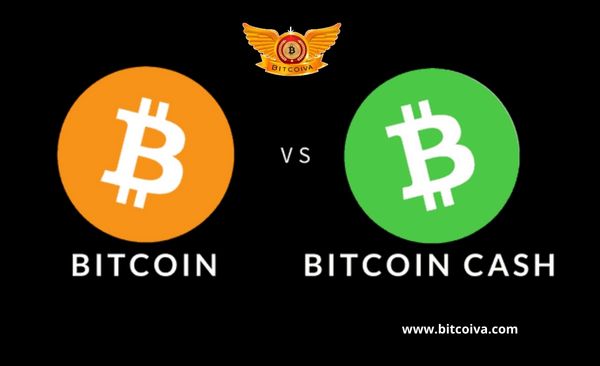As developers on each network had distinct objectives, the number of discrepancies between Bitcoin Vs Bitcoin Cash grew over time. Both cryptocurrencies’ differences grew to the point that the community now views them as entirely different types of assets.
How Bitcoin and Bitcoin Cash Differs
Difficulty Modification
The difficulty adjustment mechanism implemented to Bitcoin Cash (BCH) is one of the primary distinctions between Bitcoin and BCH. Bitcoin miners can switch to the Bitcoin Cash network when it becomes more profitable for them to mine on it because both networks employ the same SHA-256 hashing algorithm.
This implies that the computational power underlying the network can vary drastically depending on market swings. By halving difficulty if blocks are behind schedule or tripling it if they are ahead of schedule, the difficulty adjustment algorithm makes sure that blocks are manufactured at a steady rate every 10 minutes.
Block Size Variations
The size of each network’s blocks is the primary source of variation. Block sizes on Bitcoin remain at 1 MB, while on Bitcoin Cash, they have increased to 32 MB. As a result, BCH transactions now only cost a cent and can handle up to 200 transactions per second.
The size of the blockchain hasn’t increased exponentially, contrary to expectations, because Bitcoin Cash hasn’t been processing enough transactions to fill up its extra block space. A branch of Bitcoin Cash called Bitcoin SV (BSV) wants to increase its block size to 1 TB, and as a result, its blockchain is now considerably bigger than Bitcoin’s.
Decentralized Finance and Intelligent Contracts
According to Square CEO Jack Dorsey, Bitcoin does not allow smart contracts, but efforts are being made to assist develop decentralised finance (DeFi) applications on top of it. To allow more complicated functionalities, Bitcoin Cash has begun utilising smart contract languages like Cashscript.
To help Bitcoin Cash compete with Bitcoin and Ethereum, Cashscript plans to introduce DeFi to it. To increase network privacy, some solutions, such as CashSuffle and CashFusion, have already been developed.
Issue of Tokens
Projects must use the Omni layer, a platform “for producing and exchanging unique digital assets and currencies,” in order to issue tokens on top of the Bitcoin blockchain. Omni transactions are Bitcoin transactions with “next-generation capabilities,” however stablecoins have been the primary focus of the layer’s adoption.
The Simple Ledger Protocol, on the other hand, was made by Bitcoin Cash. The protocol enables the issuance of tokens on top of BCH in a manner akin to that of token issuance on top of the Ethereum blockchain.
Some assets have been released as SLP tokens as well as on the Omni layer. The ability to exist on various blockchains makes it simpler for consumers to select the network of their choice. But acceptance of both methods has been a little underwhelming.
Non-fungible tokens (NFTs), which may be distinguished from one another, are likewise supported under the SLP protocol. In contrast to Ethereum or other blockchains, their use on BCH has been less widespread.
Replace-By-Fee
Replace-by-fee (RBF) is a feature of the Bitcoin network that enables users to replace an unconfirmed transaction with a new version of it that has a greater transaction cost attached in order to get a transaction that is “stuck” without being processed.
When transactions need to be processed as quickly as possible, RBF can be employed, however others believe it may make it simpler for bad actors to spend the same money twice. They contend that an attacker can use RBF to transmit a transaction for a very tiny price in order to pay for a good or service. The identical transaction can be sent with a larger fee to a wallet that the recipient controls if they choose not to wait for enough network confirmations.
The network would then drop the transaction paying the merchant for their goods or services and confirm this second transaction first. To avoid this, most RBF implementations demand that the transaction contain all of the same outputs.
RBF also becomes difficult if the recipient waits for a few network confirmations because the transaction has already been approved.
Despite this, Bitcoin Cash has abandoned this option, making unconfirmed transactions on its network irrevocable. Double spending with RBF would still become much more difficult because transactions are confirmed more quickly due to its higher transaction throughput.

Which is Best Investment Bitcoin vs. Bitcoin Cash
Before talking about these currencies from an investment standpoint, it’s important to understand that these assets’ prices are driven by demand and perceived worth. Unlike when investing in equities and gold, you are not purchasing something that is supported by something more basic.
It is therefore preferable to only invest funds that you can afford to lose. For instance, BTC’s price first crossed the $60,000 threshold this year before quickly falling to below $30,000.
Crypto is not for you if this causes you to have nightmares. If you do decide to invest, experts advise only using BTC and ETH. BCH has a very recent history compared to BTC, which has existed for more than ten years.
BTC has already repeatedly recaptured its record high, which gives some comfort. But shortly after the debut, BCH reached an all-time high of $3,785, and since then, it has remained in the $500–$1500 range.
Depending on whether you want something to use for transactions or a long-term investment, you should acquire Bitcoin Cash or Bitcoin.
“Since its launch, the price of BCH has decreased steadily when expressed in BTC. It seems sense that the first version of Bitcoin would be a safer investment, said Gebbing.
BCH, on the other hand, “may be used for near-zero costs due to the greater block size and the smaller utilisation of that chain,” Gebbing continued. “If picking a blockchain to transact with, though, BCH is accepted in many of the same sites that take BTC.”
As with any cryptocurrency investment, Star cautions you to exercise caution. “Anyone thinking about investing in Bitcoin or Bitcoin Cash should ask themselves if they can handle a volatile asset class like cryptocurrency.” He added that anyone interested in learning more about cryptocurrencies and cutting-edge technology can gain from going outside the most well-known choices, such as Bitcoin and Ethereum.
Although the idea behind Bitcoin Cash has considerable promise, it has not yet achieved its aspirational objective of displacing the original Bitcoin. It might give its elder, bigger sibling a rougher run if it starts to gain traction as a more widely used medium of trade.
Bottom Line
In conclusion, Both BTC and BCH have high volatility, but BTC has a more valuable brand. It is far better positioned than BCH and is seen as a safe refuge for cryptocurrency investors.
Visit us on: www.bitcoiva.com

